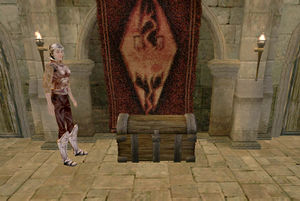Morrowind:Containers

Containers are world objects that have the ability to store other objects inside of them. In most cases, the contents of a container can be accessed by activating them. Many containers also allow the player to store new inventory items in them, which is helpful in keeping items that are not needed currently but may be needed at a later point in the game.
Along with the more obvious types of containers (chests, barrels, crates, etc.) are NPCs, both alive and dead. This is because their inventory can be accessed by activating their body when dead, or by activating them while sneaking to pickpocket while alive.
Contents
Container Capacity[edit]
Containers in Morrowind have limited capacity restricting the combined weight of the items put inside. Typical values are shown below:
| Container | Capacity |
|---|---|
| Ancient Chest | 200 |
| Ancient Wooden Chest | 200 |
| Barrel | 50 |
| Basket | 50 |
| Chest | 200 |
| Chest of Drawers | 300 |
| Closet | 300 |
| Cloth Sack | 50 |
| Container | Capacity |
|---|---|
| Crate | 200 |
| Cupboard | 100 |
| Desk | 75 |
| Drawers | 300 |
| Heavy Dwemer Chest | 200 |
| Heavy Dwemer Desk | 50 |
| Large Chest | 200 |
| Ornate Dwemer Chest | 200 |
| Container | Capacity |
|---|---|
| Sack | 50 |
| Small Chest | 25 |
| Table | 25 |
| Urn | 100 |
| Wooden Barrel | 50 |
| Wooden Chest | 150 |
| Wooden Crate | 200 |
| Worn Chest | 150 |
There are some exceptions to this rule, such as the legions of smaller urns of bonemeal present in every tomb, which only have a capacity of 10.
Containers whose weight capacity is exceeded through either developer oversight or random loot generation can exist. This may lead to a situation where items the player takes out do not necessarily fit back inside.
Organic and Respawning Containers[edit]
Containers have a few attributes that affect their usability. Many container objects, such as mushrooms or Ebony veins, are marked as "Organic," which prevents any items from being placed inside of them. Organic containers can have an additional attribute that allows their contents to replenish. Oddly, the way the engine works requires any replenishing container to be marked as Organic, so the supply chests present in guild halls are technically Organic.
There exist no containers which respawn their contents and are not Organic. Virtually any container is a safe storage place in the sense that no items will disappear from them after a few days.
A quirk of how the game saves container data allows for the manipulation of container contents. The game will generate the contents of a fresh container every time the player enters a cell. If a container in the cell has not been modified (i.e. no items moved into or out of it), then the game will not save its contents. The container can be re-generated when the cell is no longer loaded, allowing a particular player to keep manipulating a random container until it presents the desired loot.
Owned Containers[edit]
When a container is flagged as "owned", all objects removed from it are marked as stolen from the owner. This makes such a container undesirable for usage in the event of a surrender to the guards and the subsequent loss of the player's items. As with all stolen items, this fact is not tied to the individual references but becomes a mark on your permanent record.
Locked and Trapped Containers[edit]
Much like doors, containers can be locked and/or trapped.
A locked container does not show its contents until it is unlocked using the correct key, the Open spell effect or a lockpick.
A trapped container, when opened, casts a harmful effect to the player. Traps can be removed using the correct key or a probe. There is no magical means of removing traps; however, the Telekinesis spell effect allows trapped doors or containers to be opened from a safe distance.